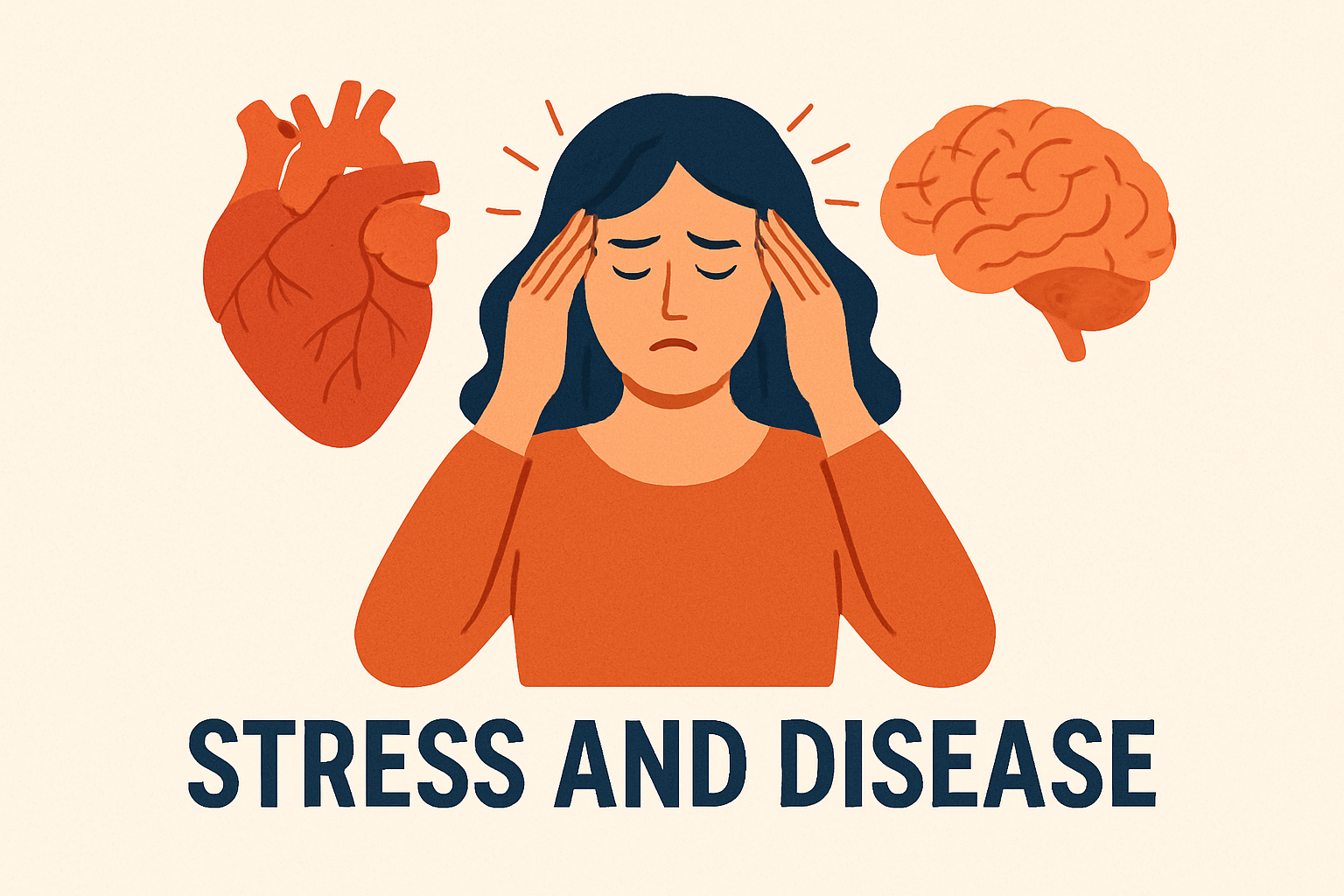Introduction: More Than Just a Feeling
We often think of stress as something that happens only in the mind — worrying about deadlines, finances, or relationships. But science is increasingly clear: stress doesn’t just live in your head; it lives in your body.
Some even say stress is the “real cause of all diseases.” While that’s an exaggeration, there’s truth in it: chronic stress is a powerful amplifier of illness. It may not always cause disease by itself, but it often makes diseases worse, weakens your body’s defenses, and slows down healing.
In this post, we’ll explore:
- The science of how stress impacts your body
- What research says about stress and major diseases
- Why stress isn’t the only cause of illness — but one of the most underestimated
- Practical steps you can take to reduce the hidden burden of stress
Table of Contents
What Happens in Your Body During Stress?
When you feel stressed, your body activates the “fight-or-flight” response:
- Stress hormones like cortisol and adrenaline flood your system
- Your heart rate and blood pressure rise
- Energy is diverted to survival functions, while long-term repair systems (like immunity, digestion, and reproduction) are put on hold
This short-term stress response can be helpful in emergencies. The problem comes when stress never lets up. Chronic stress means your body is stuck in survival mode — and that’s where trouble begins.
Stress, Inflammation, and Disease: The Hidden Chain Reaction
1. Stress Weakens Immunity
Long-term stress suppresses immune function, making it harder to fight infections and even impacting how the body detects cancer cells.
2. Stress Fuels Inflammation
Stress increases pro-inflammatory chemicals in the body. Chronic inflammation is a known driver of heart disease, diabetes, autoimmune disorders, and even Alzheimer’s.
3. Stress Damages the Heart and Blood Vessels
Constant high blood pressure and stress hormones strain the cardiovascular system, raising the risk of hypertension, stroke, and heart disease. A meta-analysis found people with high psychological distress had 28% higher risk of heart disease.
4. Stress Alters the Brain
Chronic stress reshapes brain circuits involved in memory, focus, and emotional regulation. It is linked to depression, anxiety, and cognitive decline.
Is Stress the Root of All Diseases?
The bold claim that “stress causes all diseases” is an oversimplification. Here’s a more accurate view:
- Diseases are multi-causal — genetics, lifestyle, infections, and environment all matter.
- Stress is an amplifier — it may not always start the disease, but it often worsens it or speeds it up.
- Stress and disease feed each other — illness causes stress, which in turn worsens illness, creating a vicious cycle.
So while stress isn’t the single cause, it is one of the most underestimated hidden drivers of poor health.
Scientific Evidence: What Studies Say
- Immune system link: A review of 300+ studies showed stress consistently alters immunity, making people more prone to illness.
- Heart disease connection: High psychological distress predicts significantly higher cardiovascular risk.
- Allostatic load theory: Neuroscientist Bruce McEwen introduced the concept of “allostatic load” — the wear-and-tear of chronic stress — which predicts many chronic conditions.
- Inflammation and mental health: Stress-induced inflammation is strongly associated with depression and anxiety.
Read https://www.apa.org/topics/stress/body
How to Protect Yourself: Practical Stress-Management Tips
Reducing stress doesn’t mean eliminating it completely (which is impossible). It means building resilience and lowering your body’s long-term “stress load.”
Daily Habits to Reduce Stress Load
- Mindful breathing: Just 5–10 minutes of slow, deep breathing lowers cortisol and heart rate.
- Regular movement: Moderate exercise reduces stress hormones and boosts mood-enhancing endorphins.
- Quality sleep: Prioritize 7–9 hours; poor sleep magnifies stress effects.
- Social connection: Spending time with supportive people buffers against stress-related illness.
- Nature time: Walking outdoors or gardening reduces stress and inflammation markers.
Professional Support
- Therapies like CBT or mindfulness-based stress reduction have been proven to reduce both stress and related health risks.
- If stress feels overwhelming, consulting a mental health professional can be as important as seeing a doctor for physical symptoms.
Conclusion: Stress Isn’t Everything, But It’s Everywhere
Stress isn’t the root of all disease, but it is a hidden accelerator of many illnesses. It weakens immunity, fuels inflammation, and makes the body less resilient.
The hopeful part? Unlike some risk factors we can’t change (like age or genetics), stress is modifiable. With daily practices, lifestyle changes, and support, we can protect both body and mind.
Taking stress seriously isn’t just about feeling calmer — it’s about living longer and healthier.
